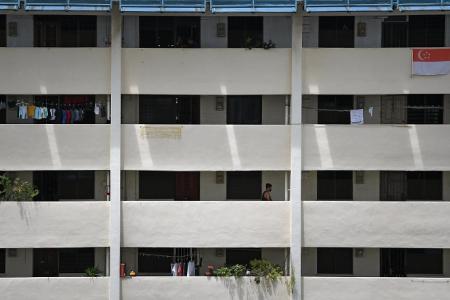Community Relations Unit can forcibly declutter homes of hoarders
The new Community Relations Unit (CRU) will have powers to enter homes and forcibly declutter them in cases of severe hoarding, Senior Minister of State for National Development Sim Ann said in Parliament.
The CRU, which will be formed after changes to the Community Disputes Resolution Act were passed on Nov 12, will focus on tackling two types of community disputes – cases involving hoarding and severe noise.
Ms Sim said the bulk of the cases the CRU will deal with will be noise-related, since the volume of severe hoarding cases is not high.
That said, hoarding is an issue that poses public health and safety risks, she added.
In severe hoarding cases, the home may be infested with pests from rotting food, which could affect neighbours. Clutter is also a potentially fatal fire hazard, she noted.
She pointed out that the director-general for community relations who will head the CRU can apply to the Community Disputes Resolution Tribunals (CDRT) to forcibly declutter a residential unit as a last resort, after efforts from front-line agencies have been exhausted and the hoarder still fails to comply.
If such an order is granted, the CRU’s community relations officers will be authorised to enter the unit to remove and dispose of hoarded materials and items.
Other than the hoarding issue, the CRU will also focus on disputes where noise is causing severe suffering to neighbours, said Ms Sim.
Officers will have a range of powers, including to issue direction to compel parties to go for mediation at the Community Mediation Centre. Failing to comply will be an offence.
The officers can also deploy noise sensors to collect evidence on the direction, timing and intensity of the noise nuisance.
Ms Sim said the sensors would help plug a gap – at the moment, a complainant would have to attempt to collect evidence, usually by making audio recordings on their mobile phones.
“These recordings are unable to tell us the intensity or direction of the noise disturbance. They can also easily be distorted upon playback, or edited, and therefore cannot be relied upon for official investigations or court proceedings,” she said.
The sensors, which are also a “sensible alternative” to deploying officers on long stakeouts, will be used only after initial investigations have narrowed down the unit where the noise might be coming from.
Their deployment will also require consent of the home occupier, or if it is installed in a common area, its managing agent.
Ms Sim said some members of the public suggested that the CRU be given the power to deploy these noise sensors without consent, but the Government has decided this is not necessary for now.
Servers storing data from the sensors will have strict access controls. Conversations picked up by the sensor will not be available to officers, she said.
Ms Sim also said officers must identify themselves by showing their official identification cards before exercising their powers. This can be verified on the Ministry of National Development website.
She added that the director-general of the CRU can issue abatement orders to individuals to compel them to stop acts that are disturbing their neighbours – failing to comply will be a criminal offence.
In the case of disputes that involve a person with mental health issues, Ms Sim said that officers will work with partner agencies like the Agency for Integrated Care, the Institute of Mental Health, and the police to help an individual get treatment.
If such a resident does not want to seek treatment voluntarily, the CRU’s director-general can apply to the CDRT for a mandatory treatment order as a last resort.
Such an order will require a person believed to have an underlying psychiatric condition to go for treatment.
Ms Sim said the CRU will be piloted for a year in Tampines, because it has an average case load, compared with those in other towns in Singapore.
“The pilot will also allow us to assess how the model could be scaled up in a sustainable manner,” said Ms Sim.
She added that the initial team of 15 full-time officers has been formed and operations will begin from the second quarter of 2025.
In Parliament, five MPs, including Mr Derrick Goh (Nee Soon GRC), and the Workers’ Party’s Sylvia Lim (Aljunied GRC), asked if the roll-out of the CRU could be accelerated or expanded to other estates. They said scaling up the pilot will ensure that more residents will benefit.
Ms Sim urged MPs to be patient and give the Government time to pilot and review the CRU model carefully in order to “ensure that our processes are effective and that manpower needs for expansion of coverage are sized correctly”.
Ms Ng Ling Ling (Ang Mo Kio GRC) asked if there were measures in place to safeguard residents who might have neighbours who make baseless, malicious complaints against them.
Ms Sim said there are safeguards in place against these “unmeritorious complaints”, noting that the CRU has the discretion not to investigate or take further action for frivolous and vexatious allegations.
Its director-general may also direct the individual not to make further unfounded complaints. Failure to comply will be an offence.
Ms Sim added that the CRU’s role is to deal with neighbour disputes where prior attempts at amicable solutions have been exhausted.
“The enhancements are not intended to supplant community-driven solutions, and over-reliance on CRU intervention can erode the essence of our community spirit over time,” she said.
Get The New Paper on your phone with the free TNP app. Download from the Apple App Store or Google Play Store now


